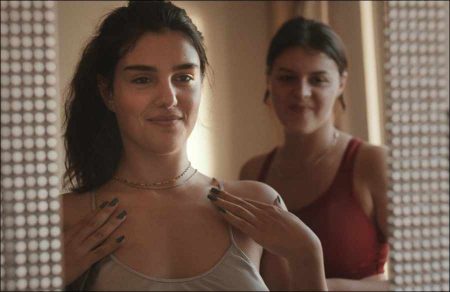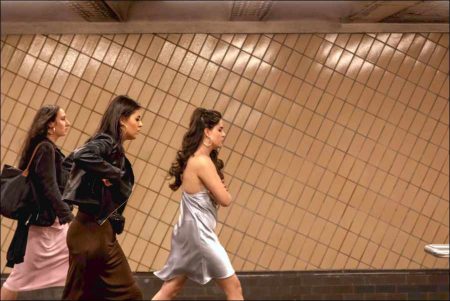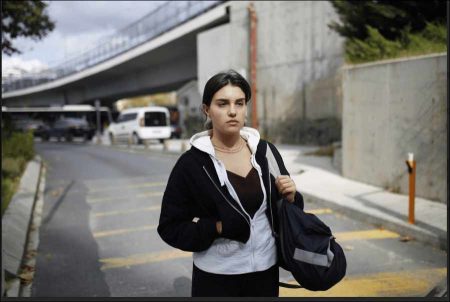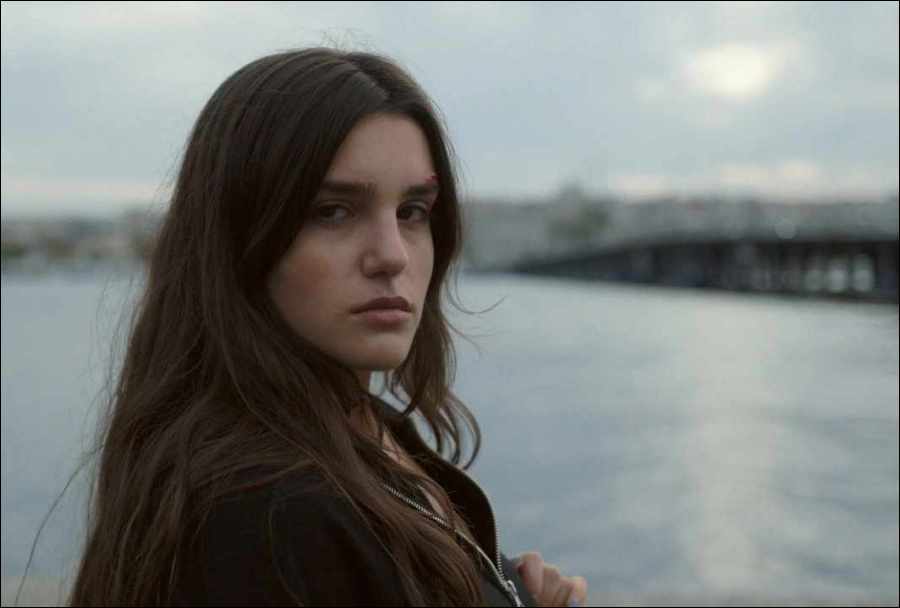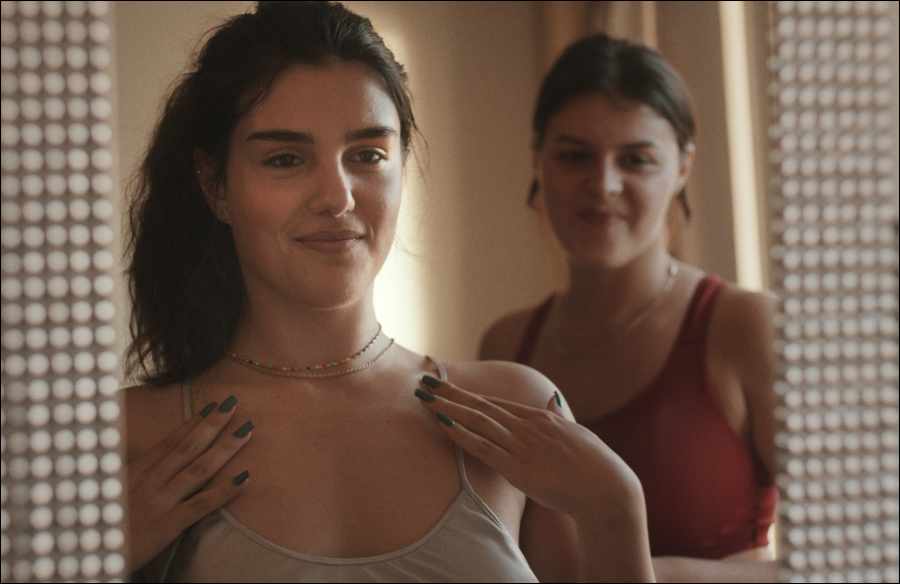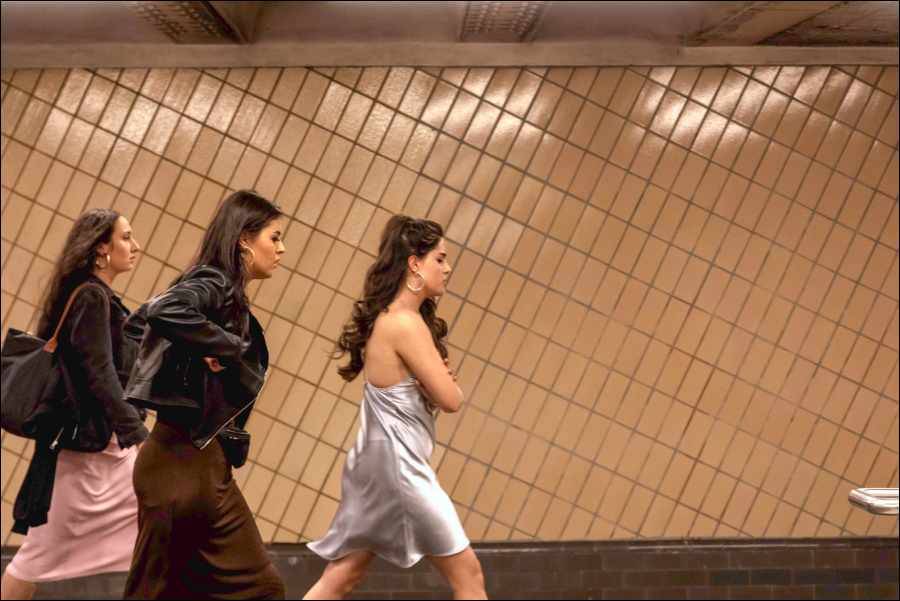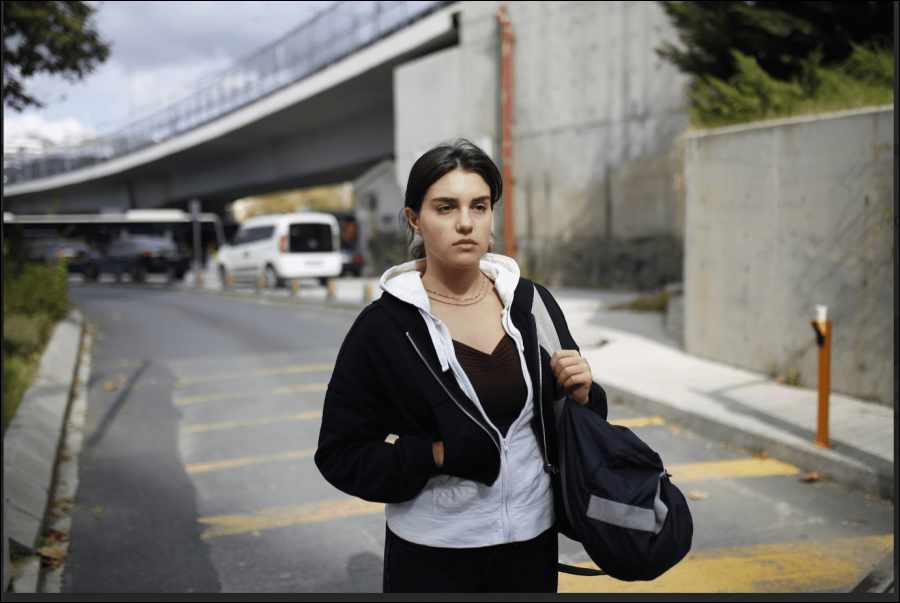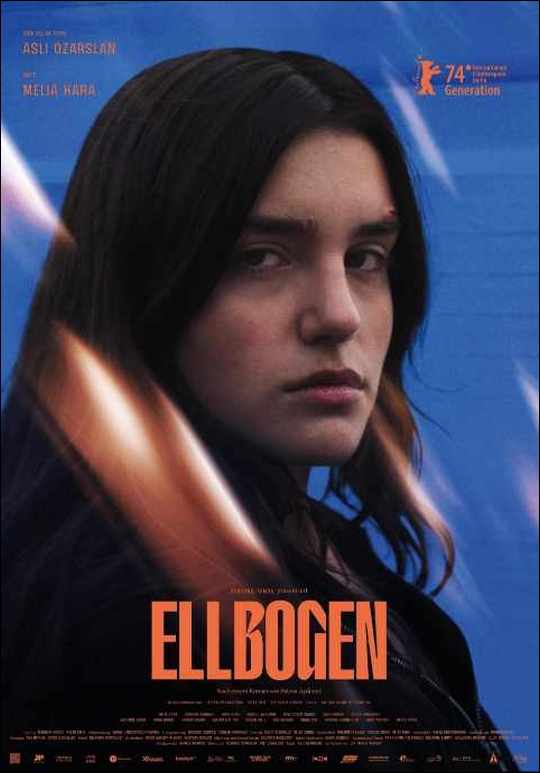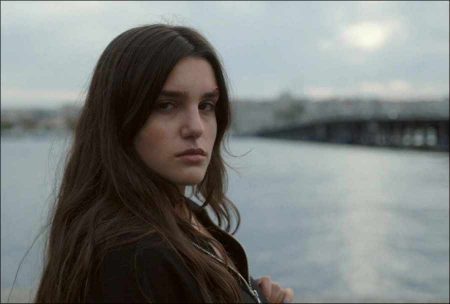
Elbow movie storyline. Elbow (Ellbogen) tells the story of Hazel, a young Turkish woman who is pushed out of society and has to reset the course of her life. We want to run through the night with her; we want to know what happens next – for her, and for us all.
Hazal (Melia Kara) is of Turkish origin and living in Berlin. She turns eighteen and is looking for a job. She is not interested in the offer of a three-month apprenticeship in a bakery. She celebrates her birthday, calls her parents, interacts with other girls, and meets Mehmet (Doga Gürer). To his surprise she moves into his apartment, and they share a bed. There is interaction with friend Elma (Jamilah Bagdach). They have similar problems: stolen money, physical confrontation, police arrest, etc. It’s too much and Hazal runs off to Turkey, hoping to find a better life in a new environment of which she knows very little.
Ellbogen means “Elbow” in English and “Dirsek” in Turkish. The plot consists of Hazal “elbowing” her way through a complicated life both in Germany and Turkey. About 80 percent of the screen works with close-ups with less wide-range photography. It shows in German with Turkish subtitles and premiered at the 74th Berlinale Film Festival. It should receive wide interest in Germany where Turks are the largest foreign population with over 1.5 million residents. Ellbogen is based on the book of the same title by Fatma Aydemir, who has a similar Turkish/German background. (Becky Tan)
Elbow (German: Ellbogen) is a 2024 coming-of-age drama film co-written and directed by Aslı Özarslan in her directorial debut. The film an adaptation of Franz-Hessel-Preis and Klaus-Michael Kühne prize winner German novel Ellbogen by Fatma Aydemir is a story of 17-years old Hazal, who lives in Berlin. Her biggest wish for her 18th birthday is to escape the everyday grind and party with her friends. But a fatal incident changes everything and she is forced to flee.
The international co-production between Germany, Turkey and France was selected in the Generation 14plus section at the 74th Berlin International Film Festival, where it had its World premiere on 17 February and competed for Crystal Bear for the Best Film. Aslı Özarslan, the first feature director was nominated for GWFF Best First Feature Award in the festival.
Hazal’s greatest wish is to have a life. In spite of many applications, she isn’t invited to a single job interview. Instead, she is stuck in a Job Centre training program that fails to open up any new opportunities for her. But on her 18th birthday, Hazal feels powerful. It is like the old days when she and her friends believed they could achieve anything as long as they stuck together. It’s only when they’re queueing to get into a hip club that Hazal feels they don’t belong there.
And she’s right. The bouncer refuses to let them in. On their way home, they’re verbally abused by an arrogant student. The situation escalates, Hazal’s frustration about all the rejections erupts into a fatal act. Hazal flees headlong to Istanbul, a strange city in a country unknown to her. There, she has to survive on her own, no matter what the cost.
Film Review for Elbow
Every year, the Generation section of the Berlinale includes a coming-of-age film about immigrant youth, often made by filmmakers who are themselves second-generation immigrants. This year, that film is Elbow, co-written with Claudia Schaefer by its director, Berlin-born Aslı Özarslan, and based on the novel by Fatma Aydemir. But while it follows some of the familiar tropes of the sub-genre, this picture stands out for its unusually dark and violent elements, storytelling economy, thematic variety and depth, and the performance of the young lead actress Melia Kara.
She plays Hazal, whose Turkish mother works as a bakery employee and her father as a taxi driver. Hazal is about to turn 18 and is acutely aware of the xenophobia and racism in Berlin society, which are depicted as not at all casual, but rather aggressive and direct. In constant conflict with her mother, Hazel wants more for herself than being a cashier, a waitress or a prostitute, but everything she experiences tells her in no uncertain terms that this is the only kind of future possible for “people like her.” Her long-disillusioned mother agrees with this and wants her to train as a hairdresser. Subjected to insult after insult, Hazal grows increasingly bitter, but unlike many other humiliated immigrants, she doesn’t keep her mouth shut and actually strikes back.
After she and her two best friends are not let into a cool club for her birthday celebration, the group gets cat-called and racially abused by a young man in the U-Bahn station. The no-nonsense Elma (Jamilah Badgach) punches him and Hazal joins in, accidentally killing the guy. The next thing we know, she is running away to Istanbul and surprising her friend Mehmet (Doğa Gürer), another Berlin-born Turk. She crashes at his place, and he turns out to be both more and less than she expected.
In Istanbul, a city completely foreign to her, she finds a new level of freedom but also encounters a whole new set of problems, and learns that she is not at home there either. Mehmet’s roommate Halil (Haydar Şahin), an activist, opens her eyes to the reality of the Kurdish issue, while Hazal is not even sure if her family belongs to the ethnic group. “Aren’t we all Turks?”, she asks naively.
Almost all of the scenes in the film serve a clear dramatic and narrative purpose. Hazal’s bitterness and defiance are finely graded and her character develops accordingly — and explosively, too. Other characters are also well-rounded, although the dialogues in segments with Halil do come across as a bit contrived. Cinematographer Andaç Karabeyoğlu-Thomas works in a classical manner, resorting to a handheld camera only in a couple of key instances, while the editing by Ana Branea and David J. Achilles mirrors Hazal’s character development, often with abrupt cuts and loud sound effects.
Kara is excellent as Hazal. She is a young woman, but has retained a baby-faced appearance and youthful energy that make her outbursts all the more jarring and impactful. It is the way she portrays Hazal’s desperate defiance that provides her character with its most interesting facet: the tortured reality of being both victim and perpetrator. This aspect of the film, when taken together with its other key themes — identity, family relations, societal positions, culture clashes — turns out to be its most compelling and thought-provoking dimension.
Elbow (2024)
Ellbogen
Directed by: Aslı Özarslan
Starring: Melia Kara, Doğa Gürer, Jale Arıkan, Haydar Şahin, Orhan Kılıç, Jamilah Bagdach, Asya Utku, Mina Sağdıç, Nurgül Ayduran, Katrine Eichberger, Sultan Elif Taş, İdil Baydar, Ömer Kuzu
Screenplay by: Claudia Schaefer, Aslı Özarslan (based on the novel by Fatma Aydemir)
Production Design by: Katja Deutschmann
Cinematography by: Mark Cousins
Film Editing by: David J. Achilles, Ana Branea
Costume Design by: Silvia Albarella
Set Decoration by: Hanna Klumpp, Melissa Tosun, Fausto León Torelli Tulissi
Art Direction by: Görkem Canbolat, Nina Laçin
Music by: Delphine Mantoulet
MPAA Rating: None.
Distributed by: jip Film & Verleih
Release Date: February 17, 2024 (Berlinale), September 5, 2024 (Germany), September 18, 2024 (Austria)
Views: 35
